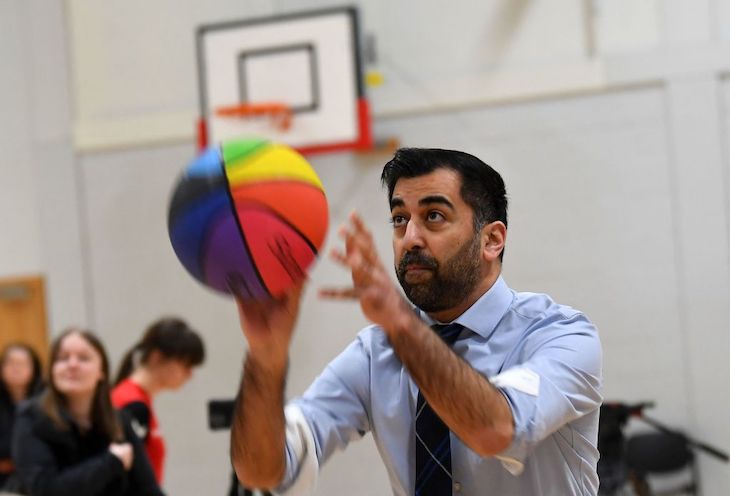This week was supposed to be Humza Yousaf’s big relaunch for the SNP. His speech on Tuesday was designed to show how he was combining his adopted role as the ‘son of Sturgeon’ with his ability to be his own man. Alas, it was not to be: the arrest of SNP treasurer Colin Beattie completely and utterly derailed the new First Minister’s best-laid plans.
Yousaf had wanted to show he recognised that the relationship between the Scottish government and the business community had fallen into a ditch, to make clear it needed a ‘reset’. His willingness to compromise came in his announcement that the deposit return scheme would be delayed, and plans to ban alcohol advertising would return to the ‘drawing board’. This can’t have been easy: Yousaf’s talk of ‘A New Deal for Scottish Business’ will have ruffled more than a few Green feathers. And though he was demonstrating that he could process and respond to criticisms that had been levelled at him for not espousing such sentiment during the leadership contest, no one outside of the Holyrood bubble was listening. Beattie’s arrest stole Yousaf’s TV top slots and front pages.
Scottish state schooling has become allergic to excellence
But the First Minister will get another go at the business reset. More important to focus on then is the movement seen in Scotland’s education policy. This week, Yousaf announced that Scotland would rejoin the Trends in International Mathematics and Science Study (TIMSS) and the Progress in International Reading Literacy Study (PIRLS), the leading international comparators of how education systems are performing. These studies are the only way for countries to benchmark themselves against one another, to avoid the confirmation bias politicians often succumb to as they tell themselves they are doing a wonderful job.
But nearly 15 years ago, Scotland withdrew from these studies. Opponents both in the political arena and in education suggested that the government didn’t like the answers, and therefore stopped asking the questions. Since then, in truth we know very little about how Scotland’s children are faring amongst their global peers. We rely on the anecdotal, school-by-school evidence of teachers and parents.
My own experience as a parent adds ballast to the well-expressed fears of many independent education experts. Scottish state schooling has become allergic to excellence and instead obsessed with mediocrity and uniformity. The blame for what appears to be a rapid decline lies at the door of an exceptionally well-meaning aim to close the poverty-related attainment gap. Human nature has kicked in, and with no discernible evidence that those children in the poorest schools, with the poorest attainment, are improving, it is as inevitable as night following day that those with targets to meet will close the attainment gap from the other end of the spectrum. If you can’t lift up the bottom, squash down the top.
Prevent kids from moving onto the next textbook until all their classmates have finished the previous one. Seen it. Make kids take a book to school so they have something to do while their classmates finish their work. Seen it. It doesn't help the kids who are struggling, and it doesn't help the kids who are excelling.
Scotland has an educational and intellectual history to rival any country in the world, with a rich history of medical discovery, inventions and of course the Enlightenment. It cannot be allowed to flounder as a result of tick-box processes and unhelpful targets. The Scottish government needs to get rid of this attainment gap goal and devise a new system that ensures all children can excel.






Comments